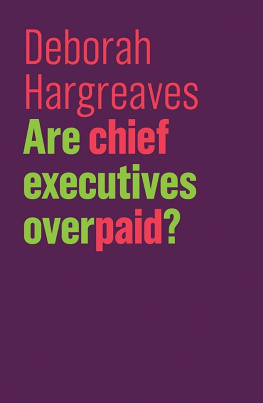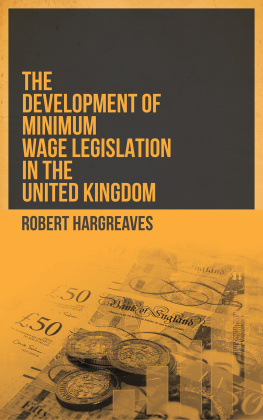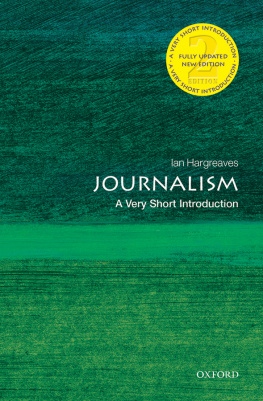Deborah Hargreaves - Are Chief Executives Overpaid ?
Here you can read online Deborah Hargreaves - Are Chief Executives Overpaid ? full text of the book (entire story) in english for free. Download pdf and epub, get meaning, cover and reviews about this ebook. year: 2018, publisher: John Wiley & Sons, genre: Politics. Description of the work, (preface) as well as reviews are available. Best literature library LitArk.com created for fans of good reading and offers a wide selection of genres:
Romance novel
Science fiction
Adventure
Detective
Science
History
Home and family
Prose
Art
Politics
Computer
Non-fiction
Religion
Business
Children
Humor
Choose a favorite category and find really read worthwhile books. Enjoy immersion in the world of imagination, feel the emotions of the characters or learn something new for yourself, make an fascinating discovery.
- Book:Are Chief Executives Overpaid ?
- Author:
- Publisher:John Wiley & Sons
- Genre:
- Year:2018
- Rating:5 / 5
- Favourites:Add to favourites
- Your mark:
- 100
- 1
- 2
- 3
- 4
- 5
Are Chief Executives Overpaid ?: summary, description and annotation
We offer to read an annotation, description, summary or preface (depends on what the author of the book "Are Chief Executives Overpaid ?" wrote himself). If you haven't found the necessary information about the book — write in the comments, we will try to find it.
Are Chief Executives Overpaid ? — read online for free the complete book (whole text) full work
Below is the text of the book, divided by pages. System saving the place of the last page read, allows you to conveniently read the book "Are Chief Executives Overpaid ?" online for free, without having to search again every time where you left off. Put a bookmark, and you can go to the page where you finished reading at any time.
Font size:
Interval:
Bookmark:
The Future of Capitalism series
Chuck Collins, Is Inequality in America Irreversible?
Peter Dietsch, Franois Claveau, and Clment Fontan, Do Central Banks Serve the People?
Danny Dorling, Do We Need Economic Inequality?
Deborah Hargreaves, Are Chief Executives Overpaid?
Steve Keen, Can We Avoid Another Financial Crisis?
Ann Lee, Will Chinas Economy Collapse?
Malcolm Sawyer, Can the Euro be Saved?
Deborah Hargreaves
polity
Copyright Deborah Hargreaves 2019
The right of Deborah Hargreaves to be identified as Author of this Work has been asserted in accordance with the UK Copyright, Designs and Patents Act 1988.
First published in 2019 by Polity Press
Polity Press
65 Bridge Street
Cambridge CB2 1UR, UK
Polity Press
101 Station Landing
Suite 300
Medford, MA 02155, USA
All rights reserved. Except for the quotation of short passages for the purpose of criticism and review, no part of this publication may be reproduced, stored in a retrieval system or transmitted, in any form or by any means, electronic, mechanical, photocopying, recording or otherwise, without the prior permission of the publisher.
ISBN-13: 978-1-5095-2783-0
A catalogue record for this book is available from the British Library.
Library of Congress Cataloging-in-Publication Data
Names: Hargreaves, Deborah, author.
Title: Are chief executives overpaid? / Deborah Hargreaves.
Description: Cambridge, UK ; Medford, MA : Polity Press, 2018. | Includes bibliographical references and index.
Identifiers: LCCN 2018019580 (print) | LCCN 2018020871 (ebook) | ISBN 9781509527830 (Epub) | ISBN 9781509527793 (hardback) | ISBN 9781509527809 (pbk.)
Subjects: LCSH: Chief executive officers--Salaries, etc. | Executives--Salaries, etc.
Classification: LCC HD4965.2 (ebook) | LCC HD4965.2 .H47 2018 (print) | DDC 331.2/81658--dc23
LC record available at https://lccn.loc.gov/2018019580
The publisher has used its best endeavours to ensure that the URLs for external websites referred to in this book are correct and active at the time of going to press. However, the publisher has no responsibility for the websites and can make no guarantee that a site will remain live or that the content is or will remain appropriate.
Every effort has been made to trace all copyright holders, but if any have been inadvertently overlooked the publisher will be pleased to include any necessary credits in any subsequent reprint or edition.
For further information on Polity, visit our website: politybooks.com
One of my first assignments as a junior reporter at the Financial Times in Chicago in 1987 was to cover the Black Monday stock market crash. That Octobers steep decline remains the biggest singleday fall in US stocks. It was also an early lesson for me in the role of greed in our Western markets and capitalism.
The US investors in the late 1980s thought they had invented a form of insurance through the new derivatives markets that would insulate their portfolios from dramatic losses in the event of a stock market downturn. This gave them a false sense of confidence that risk was well managed. It led many brokerages and investing institutions to take more risks with their money in pursuit of high gains.
However, when the stock market fall came, it turned out that this so-called portfolio insurance not only did not protect their investments from losses, but actually exacerbated the decline. I was to witness this exuberance and neglect of the dangers in the build-up to many more market downfalls right up to the banking crisis of 2008.
Greed has become one of the driving forces for many in our executive class, trumping long-term considerations about the future of their companies and the workforce, even overcoming fears about the fragility of capitalism itself. When there is the opportunity of enriching yourself to the extent that you and your family need never work again, who would not avail themselves of the option?
Policymakers, top public servants and academia have been sucked into the self-enrichment of the corporate elite and have sought to gain a piece of the action. Governments have been captured by business and failed to act on excessive pay at the top, politicians and public servants have sought careers in the private sector, and academics have bolstered the edifice while also feasting on the crumbs from the corporate table.
In this book, I am taking a look at how we built a super-elite class of multi-millionaire captains of industry and the implications this has for the economy, for the rest of the workforce and for us as a society. Soaring top pay and stagnating wages for the workforce have driven a sharp rise in inequality and fed perceptions of unfairness, undermining morale and faith in the system itself.
This analysis is a subjective description of what I have seen during my career and draws on lots of research done by the High Pay Commission which I chaired in 201011 and the High Pay Centre think tank which I set up in 2012.
Dysfunctional pay structures and the gulf between income for those at the top and the rest are not the inevitable products of late-stage capitalism. They are the outcome of choices made by governments and company boards about markets, incentives, tax rates and regulation. In many ways, they are also a fundamental misreading of human motivation.
Who Wants To Be a Millionaire?
it is important to ask why the global economy operates in this way. Why have wages stagnated in developed countries, while stock payments, bonuses and dividends for those at the top have exploded?
Company bosses in most Western societies are cashing in untold riches for just a few years labour in stark contrast to those who work for them, who have not had a real-terms pay rise for years.
The Brexit vote in Britain, the election of Donald Trump in the US, as well as the rise of populism in Europe, are commonly seen as an expression of frustration by those left behind by the current economic structure and moves towards greater globalization. It is worth asking how late-stage capitalism in the West has created the conditions that hand so many benefits to the few: those at the top of the income scale and the wealthy.
The economic changes that have enriched the top 1 per cent have come since the 1980s and the rise in inequality over the past 25 years risks taking us back to a Dickensian-style divergence in incomes and lifestyles if we do nothing to reverse it.
One of the markers of growing inequality is the creation of the corporate multi-millionaire class a relatively new demographic that was a rarity 20 years ago. It is the flood of income upwards into the hands of our business leaders that I want to explore in this book. This comes against the background of political choices favouring the corporate sector and policy decisions that have exacerbated a growing division between those running companies and those working for them.
In this chapter, we will explore the roots of the high pay culture, the justification that has been put up by a management elite intent on enriching itself and the way politicians have spurred them on.
Were talking about the top elite here, those (usually men) running big multinational companies in the UK, US and across the developed world (with the notable exception of Japan). When people talk of inequality, they often refer to the top 1 per cent of incomes, but these chief executives are in the top 0.1 per cent.
Chief executives pay has become part of a wider public debate about inequality across the developed world. But it is just as much about poor business practice, inefficient use of shareholders funds and weak oversight. Put simply, many top bosses pay themselves millions just because they can. The high pay phenomenon has spread to other walks of life and top levels of pay in the private sector have had an impact in the upper echelons of the public sector. But this is mainly a private sector, big company issue.
Font size:
Interval:
Bookmark:
Similar books «Are Chief Executives Overpaid ?»
Look at similar books to Are Chief Executives Overpaid ?. We have selected literature similar in name and meaning in the hope of providing readers with more options to find new, interesting, not yet read works.
Discussion, reviews of the book Are Chief Executives Overpaid ? and just readers' own opinions. Leave your comments, write what you think about the work, its meaning or the main characters. Specify what exactly you liked and what you didn't like, and why you think so.









